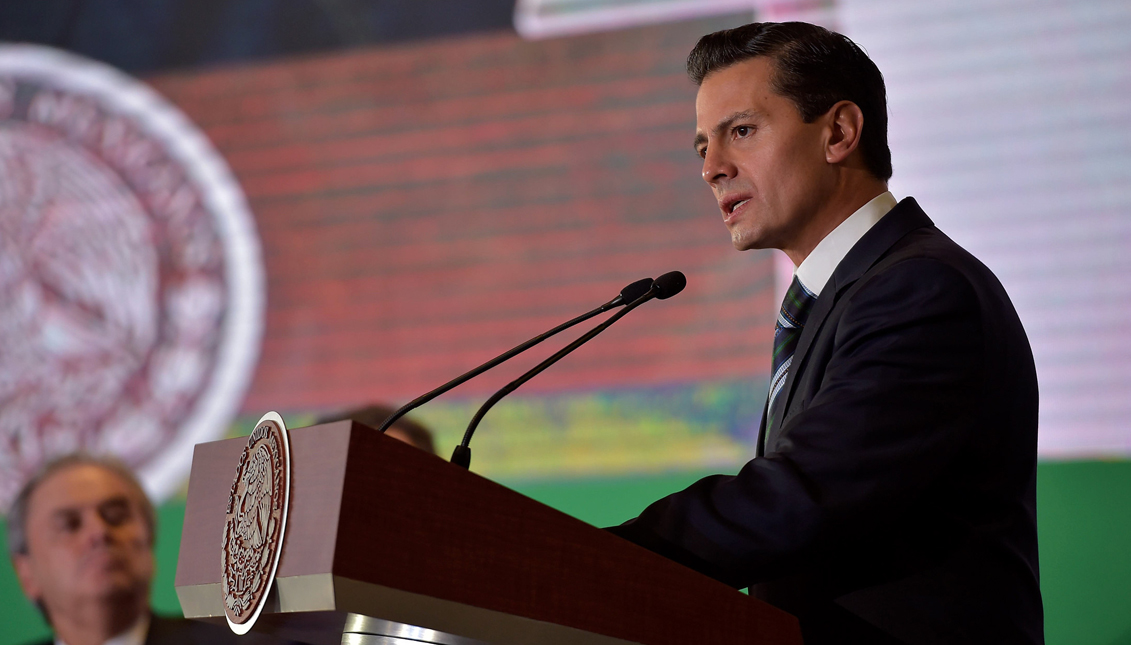
Photo courtesy of Mexican President Enrique Peña Nieto, who spoke during an event in Mexico City, Mexico, at the conclusion of the 33rd Ordinary General Assembly of the National Agricultural and Livestock Council. Peña Nieto remarked today that the…
[OP-ED]: Trump’s senseless war on Mexico
”Mexico braces for a trade war with Washington,” headline in the Financial Times, Jan. 31, 2017.
MORE IN THIS SECTION
”Mexico braces for a trade war with Washington,” headline in the Financial Times, Jan. 31, 2017.
Let’s hope not, because a trade war triggered by President Trump would be an act of pure economic aggression, unjustified either by the United States’ economic and political interests or by Mexico’s behavior. It would be the economic equivalent of Russia’s seizure of the Crimea, a raw exercise in bullying.
Our interests here are plain. The basic need is to foster a prosperous Mexico that will provide expanding markets for our exports and, at the same time, create jobs and higher incomes that keep Mexicans from migrating to the United States. (Net illegal immigration from Mexico has already halted.) Although a border wall is a legitimate way of curbing illegal immigration, it would be ineffective against a collapsing Mexican economy.
It is foolhardy and inconsistent to want Mexico to restrict its trade and weaken its economy, while also insisting that it limit immigration. That’s a formula for social and economic breakdown in Mexico, with potentially adverse side effects for the United States. Still, this seems to be Trump’s agenda, which would revise -- and perhaps discard -- NAFTA (the North American Free Trade Agreement) covering Mexico, Canada and the United States.
The main indictment against Mexico seems to be that it ran a $60.7 billion merchandise trade surplus with the United States in 2015. Mexico’s surplus supposedly destroyed U.S. jobs. Undeniably, some plants have moved to Mexico. But that’s not the whole story.
You will note that Mexico’s trade surplus involved “merchandise exports” -- goods such as cars, computer chips and machinery. What this omits is international services (tourism, financial services, patent royalties and the like). In 2015, the United States ran a $9.6 billion surplus in services with Mexico, according to figures compiled by Lucy Lu of the Peterson Institute. The service surplus with Canada was even larger, $27.4 billion.
The surpluses in services reduced the overall U.S. trade deficit with its NAFTA partners to $39.2 billion in 2015, Lu reports. That’s only 6.5 percent of total U.S. exports to Mexico and Canada ($604.2 billion) and 3 percent of total U.S. trade -- imports and exports -- with its NAFTA partners ($1.248 trillion). The U.S. economy is roughly $18 trillion in size; these modest trade deficits do not represent a significant drag on American job creation or economic growth.
What might represent a drag is a rejection of NAFTA that impedes routine trade flows. At various times, Trump or his advisers have threatened imposing duties or fees of 20 percent to 35 percent on Mexican exports to the United States. These penalties would presumably raise export prices and be passed along to U.S. consumers, who would reduce their purchases of Mexican goods.
Another vulnerability is the existence of tightly interwoven supply chains between the United States and Mexico and Canada. Many components -- especially for vehicles and electronic products -- crisscross borders repeatedly before emerging as finished goods. A recent report from the Congressional Research Service cited evidence that 40 percent of U.S. imports from Mexico consisted of U.S. value added.
If the tax or tariff applied only to Mexico’s production, its shares would need to be separated. In practice, this could pose problems given the two-way trade common to many industries. In 2015, for example, the United States imported $58 billion worth of computers and electronic products from Mexico, while exporting $43 billion in similar goods to Mexico, according to data from the U.S. International Trade Administration.
The whole logic of trade is to export so you can import. It’s true that a huge gap between exports and imports can cause political and economic problems. But that is not the case with NAFTA. The trade imbalances among Canada, Mexico and the United States are relatively modest and manageable. If Trump starts a trade war, all the NAFTA countries will be losers, even if he -- through his incendiary and distorted rhetoric -- is a political winner.







LEAVE A COMMENT:
Join the discussion! Leave a comment.